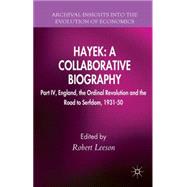Hayek: A Collaborative Biography Part IV, England, the Ordinal Revolution and the Road to Serfdom, 1931-50
, by Leeson, Robert- ISBN: 9781137452597 | 1137452595
- Cover: Hardcover
- Copyright: 3/17/2015
F.A. Hayek (1899-1992) was a Nobel Prize winning economist, famous for his defense against classical liberalism. Hayek: A Collaborative Biography is a collection of volumes which tracks the various stages of Hayek's life and his work. The chronology of Hayek's life is conveniently delineated by his eight cities of residence.This fourth volume examines his time in Vienna and Chicago (1931-1950), when Hayek held the prestigious University of London Tooke Professorship of Economic Science and Statistics.The study encompasses historical, social, political and economic viewpoints in examining Hayek's life and the history of economic thought. In the early 1930s, Hayek's business cycle work was apparently defeated by John Maynard Keynes and Piero Sraffa. However, Hayek had three successes. The Ordinal revolution, which undermined the foundations of welfare economics, was successfully transplanted from pre-war Austria and Lausanne to inter-war Britain. The Road to Serfdom (1944) attributed blame for Hitler not on those who funded him (the business sector) but on those who opposed him (socialists). In 1947, Hayek also launched the highly influential Mont Pelerin Society. Hayek had to diplomatically navigate around the other branch of the Austrian School (as represented by Ludwig Mises) whilst maintaining support from members of the nascent Chicago School. As an atheist Hayek had to compromise: the Society would not be named after two Roman Catholic aristocrats (The Acton de Tocqueville Society), but what later became known as the 'religious right' was, nevertheless, accommodated.







